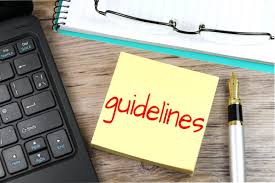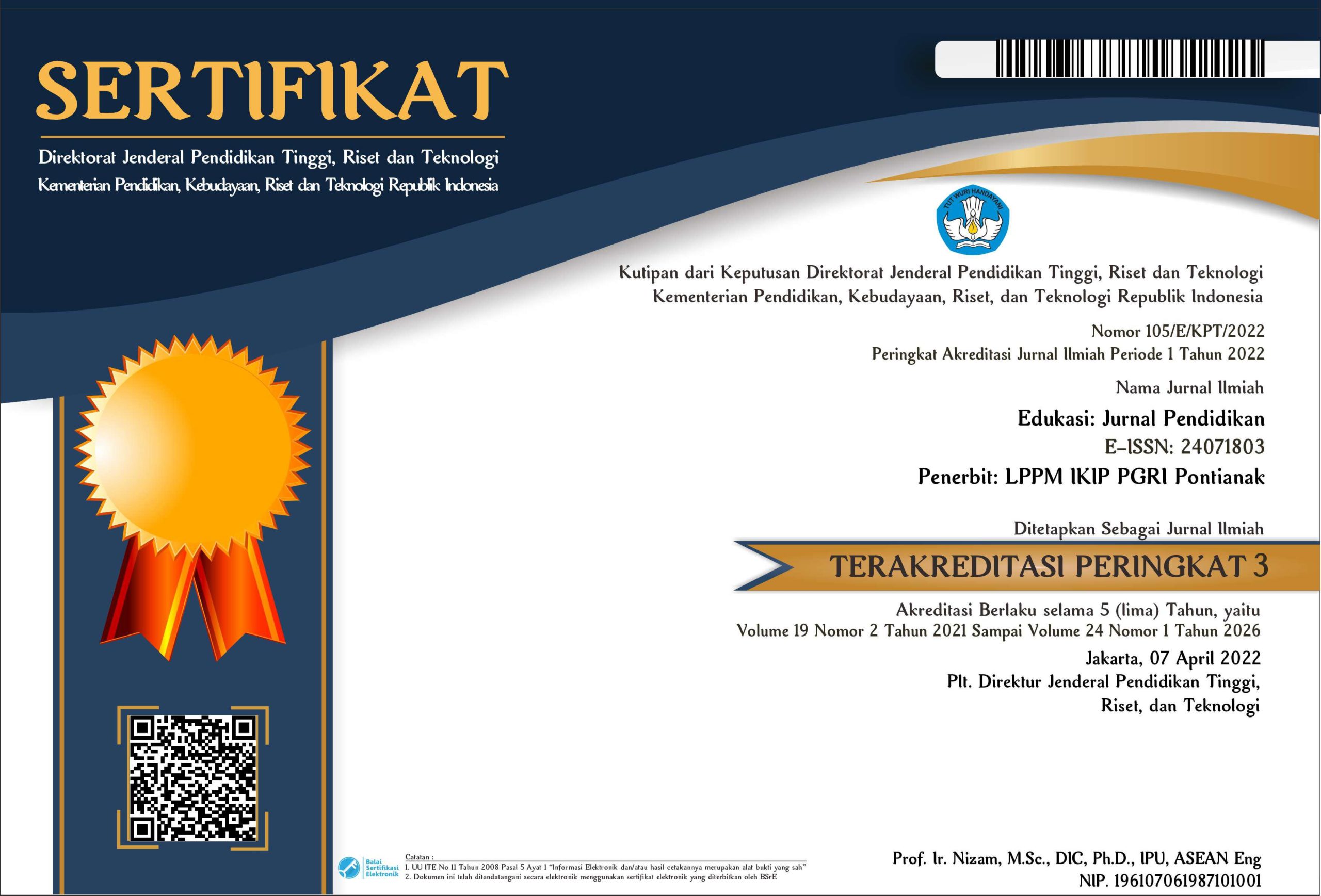Model Project-Based Learning untuk Meningkatkan Hasil Belajar di Perguruan Tinggi
DOI:
https://doi.org/10.31571/edukasi.v20i1.3675Keywords:
PjBL, hasil belajar, perguruan tinggi, study results, higher educationAbstract
Abstrak
Model Project-Based Learning (PjBL) diyakini sebagai pendekatan yang menjanjikan untuk meningkatkan pembelajaran mahasiswa di perguruan tinggi. Studi empiris tentang model PjBL telah dibuktikan dengan fokus pada hasil belajar mahasiswa. Hasil afektif berdasarkan persepsi manfaat model PjBL dan persepsi pengalaman model PjBL paling banyak diterapkan yang diukur dengan angket, wawancara, observasi, dan jurnal refleksi diri. Hasil kognitif berupa pengetahuan dan strategi kognitif serta hasil perilaku keterampilan dan keterlibatan dalam kelompok diukur dengan kuesioner, rubrik, tes, wawancara, observasi, jurnal refleksi diri, hasil kerja, dan data log. Hasil keterampilan dan keterlibatan dalam kelompok dinilai dengan rubrik. Tinjauan selanjutnya harus fokus pada investigasi lebih lanjut tentang proses belajar mahasiswa dan produk akhir.
 Â
Abstract
The Project-Based Learning (PjBL) model is believed to be a promising approach to improve student learning in higher education. Empirical studies on the PjBL model have been proven with a focus on student learning outcomes. Affective results based on the perceived benefits of the PjBL model and the perceived experience of the PjBL model were most widely applied as measured by questionnaires, interviews, observations, and self-reflection journals. Cognitive outcomes in the form of knowledge and cognitive strategies as well as behavioral outcomes of skills and involvement in groups were measured by questionnaires, rubrics, tests, interviews, observations, self-reflection journals, work results, and log data. Outcomes of skills and involvement in groups are assessed with a rubric. Subsequent reviews should focus on further investigation of the student learning process and the final product.Downloads
References
Alamri, M. M. (2021). Using Blended Project-Based Learning for Students’ Behavioral Intention to Use and Academic Achievement in Higher Education. Education Sciences, 11(5), 1-11. https://doi.org/10.3390/educsci11050207.
Berbegal-Mirabent, J., Gil-Doménech, D., & Alegre, I. (2017). Where to locate? A Project-Based Learning Activity for a Graduate-Level Course on Operations Management. International Journal of Engineering Education, 33(5), 1586-1597.
Biasutti, M., & El-Deghaidy, H. (2015). Interdisciplinary Project-Based Learning: An Online Wiki Experience in Teacher Education. Technology, Pedagogy and Education, 24(3), 339-355. https://doi.org/10.1080/1475939X.2014.899510.
Bowen, B., & Peterson, B. (2018). Exploring Authenticity Through an Engineering-Based Context in a Project-Based Learning Mathematics Activity. Journal of Pre-College Engineering Education Research, 9(1), 1-10. https://doi.org/10.7771/2157-9288.1073.
Brassler, M., & Jan Dettmers. (2017). The Transfer of Problem-Based Learning Skills to Clinical Practice. Interdisciplinary Journal of Problem-Based Learning, 11(2), 1-15. https://doi.org/10.7771/1541-5015.1678.
Brundiers, K., & Wiek, A. (2013). Do we teach what we preach? An international comparison of problem- and project-based learning courses in sustainability. Sustainability (Switzerland), 5(4), 1725-1746. https://doi.org/10.3390/su5041725.
Capp, M. J. (2018). Teacher Confidence to Implement the Principles, Guidelines, and Checkpoints of Universal Design for Learning. International Journal of Inclusive Education, 24(7), 706-720. https://doi.org/10.1080/13603116.2018.1482014.
Çelik, H. C., Ertaş, H., & İlhan, A. (2018). The Impact of Project-Based Learning on Achievement and Student Views: The Case of AutoCAD Programming Course. Journal of Education and Learning, 7(6), 67-80. https://doi.org/10.5539/jel.v7n6p67.
Chen, C. H., & Yang, Y. C. (2019). Revisiting the Effects of Project-Based Learning on Students’ Academic Achievement: A Meta-Analysis Investigating Moderators. Educational Research Review, 26(02), 71-81. https://doi.org/10.1016/j.edurev.2018.11.001.
Chua, K. J. (2014). A Comparative Study on First-Time and Experienced Project-Based Learning Students in an Engineering Design Module. European Journal of Engineering Education, 39(5), 556-572. https://doi.org/10.1080/03043797.2014.895704.
Chua, K. J., Yang, W. M., & Leo, H. L. (2014). Enhanced and Conventional Project-Based Learning in an Engineering Design Module. International Journal of Technology and Design Education, 24(4), 437-458. https://doi.org/10.1007/s10798-013-9255-7.
Cudney, E., & Kanigolla, D. (2014). Measuring the Impact of Project-Based Learning in Six Sigma Education. Journal of Enterprise Transformation, 4(3), 272-288. https://doi.org/10.1080/19488289.2014.930546.
Dana, N. F., Rigney, J., Vescio, V., & Ma, V. W. (2021). Project-Based Learning and Doctoral Student Research Skill Development: A Case Study. Impacting Education: Journal on Transforming Professional Practice, 6(4), 27-35. https://doi.org/10.5195/ie.2021.148.
Fujimura, T. (2016). EFL Students ’ Learning through Project Work in a Content-Based Course. The Journal of Kanda University of International Studies, 28(5), 105-124.
GarcÃa, C. (2016). Project-Based Learning in Virtual Groups - Collaboration and Learning Outcomes in a Virtual Training Course for Teachers. Procedia - Social and Behavioral Sciences, 228(06), 100-105. https://doi.org/10.1016/j.sbspro.2016.07.015.
Holmes, L. M. (2018). The Effects of Project Based Learning on 21. International Academic Research Conference in Vienn 2018.
Hussin, W. N. T. W., Harun, J., & Shukor, N. A. (2019). Online Interaction in Social Learning Environment towards Critical Thinking Skill: A Framework. Journal of Technology and Science Education, 9(1), 4-12. https://doi.org/10.3926/jotse.544.
Katsanos, C., Tselios, N., Tsakoumis, A., & Avouris, N. (2012). Learning about Web Accessibility: A Project Based Tool-Mediated Approach. Education and Information Technologies, 17(1), 79-94. https://doi.org/10.1007/s10639-010-9145-5.
Lee, J. S., Blackwell, S., Drake, J., & Moran, K. A. (2014). Taking a Leap of Faith: Redefining Teaching and Learning in Higher Education through Project-Based Learning. Interdisciplinary Journal of Problem-Based Learning, 8(2), 3-13. https://doi.org/10.7771/1541-5015.1426.
Ling, Y., Chen, P., Wang, J., Chen, K., & Ren, H. (2021). Design, Implementation, and Evaluation of a Scientific Modeling Course on Concentration Cells. Journal of Chemical Education, 98(4), 1163-1173. https://doi.org/10.1021/acs.jchemed.0c01408.
Lucas, N., & Goodman, F. (2015). Well-Being, Leadership, and Positive Organizational Scholarship: A Case Study of Project-Based Learning in Higher Education. The Journal of Leadership Education, 14(4), 138-152. https://doi.org/10.12806/v14/i4/t2.
Luo, Y., & Wu, W. (2015). Sustainable Design with BIM Facilitation in Project-based Learning. Procedia Engineering, 118(2015), 819-826. https://doi.org/10.1016/j.proeng.2015.08.519.
Mohamadi, Z. (2018). Comparative Effect of Project-Based Learning and Electronic Project-Based Learning on the Development and Sustained Development of English Idiom Knowledge. Journal of Computing in Higher Education, 30(2), 363-385. https://doi.org/10.1007/s12528-018-9169-1.
Muchenje, F., & Kelly, C. (2021). How Teachers Benefit from Problem-Solving, Circle, and Consultation Groups: A Framework Synthesis of Current Research. Educational Psychology in Practice, 37(1), 94-112. https://doi.org/10.1080/02667363.2020.1866501.
Naveh, G., & Bykhovsky, D. (2021). Online Peer Assessment in Undergraduate Electrical Engineering Course. IEEE Transactions on Education, 64(1), 58-65. https://doi.org/10.1109/TE.2020.3007853.
Ngereja, B., Hussein, B., & Andersen, B. (2020). Does Project-Based Learning (PBL) Promote Student Learning? A Performance Evaluation. Education Sciences, 10(11), 1-15. https://doi.org/10.3390/educsci10110330.
Rajan, K. P., Gopanna, A., & Thomas, S. P. (2019). A Project Based Learning (PBL) Approach Involving PET Recycling in Chemical Engineering Education. Recycling, 4(1), 1-16. https://doi.org/10.3390/recycling4010010.
Ralph, R. A. (2016). Post Secondary Project-Based Learning in Science, Technology, Engineering and Mathematics. Journal of Technology and Science Education, 6(1), 26-35. https://doi.org/10.3926/jotse.155.
Reis, A. C. B., Barbalho, S. C. M., & Zanette, A. C. D. (2017). A Bibliometric and Classification Study of Project-Based Learning in Engineering Education. Production, 27(Special Issue), 1-16. https://doi.org/10.1590/0103-6513.225816.
RodrÃguez, J., Laverón-Simavilla, A., Del Cura, J. M., Ezquerro, J. M., Lapuerta, V., & Cordero-Gracia, M. (2015). Project Based Learning Experiences in the Space Engineering Education at Technical University of Madrid. Advances in Space Research, 56(7), 1319-1330. https://doi.org/10.1016/j.asr.2015.07.003.
Sadeghi, H., Biniaz, M., & Soleimani, H. (2016). The Impact of Project-Based Language Learning on Iranian EFL Learners Comparison/Contrast Paragraph Writing Skills. International Journal of Asian Social Science, 6(9), 510-524. https://doi.org/10.18488/journal.1/2016.6.9/1.9.510.524.
Shpeizer, R. (2019). Towards a Successful Integration of Project-Based Learning in Higher Education: Challenges, Technologies and Methods of Implementation. Universal Journal of Educational Research, 7(8), 1765-1771. https://doi.org/10.13189/ujer.2019.070815.
Stefanou, C., Stolk, J. D., Prince, M., Chen, J. C., & Lord, S. M. (2013). Self-Regulation and Autonomy in Problem and Project-Based Learning Environments. Active Learning in Higher Education, 14(2), 109-122. https://doi.org/10.1177/1469787413481132.
Stozhko, N., Bortnik, B., Mironova, L., & Tchernysheva, A. (2015). Interdisciplinary Project-Based Learning: Technology for Improving Student Cognition. Research in Learning Technology, 23(2015), 1-13. https://doi.org/http://dx.doi.org/10.3402/rlt.v23.27577.
Sudjimat, D. A., & Permadi, L. C. (2019). Effect of Work-Based Learning Model on Students’ Achievement Motivation. Jurnal Pendidikan Teknologi dan Kejuruan, 25(2), 204-212. https://doi.org/10.21831/jptk.v25i2.24416.
Suwarno, S., Wahidin, W., & Nur, S. H. (2020). Project-Based Learning Model Assisted by Worksheet: It’s Effect on Students’ Creativity and Learning Outcomes. JPBI (Jurnal Pendidikan Biologi Indonesia), 6(1), 113-122. https://doi.org/10.22219/jpbi.v6i1.10619.
Torres, A. S., Sriraman, V., & Ortiz, A. M. (2019). Implementing Project Based Learning Pedagogy in Concrete Industry Project Management. International Journal of Construction Education and Research, 15(1), 62-79. https://doi.org/10.1080/15578771.2017.1393475.
Usher, M., & Barak, M. (2018). Peer Assessment in a Project-Based Engineering Course: Comparing Between on-Campus and Online Learning Environments. Assessment and Evaluation in Higher Education, 43(5), 745-759. https://doi.org/10.1080/02602938.2017.1405238.
Vogler, J. S., Thompson, P., Davis, D. W., Mayfield, B. E., Finley, P. M., & Yasseri, D. (2018). The Hard Work of Soft Skills: Augmenting the Project-Based Learning Experience with Interdisciplinary Teamwork. Instructional Science, 46(3), 457-488. https://doi.org/10.1007/s11251-017-9438-9.
Wu, S. Y., Hou, H. T., Hwang, W. Y., & Liu, E. Z. F. (2013). Analysis of Learning Behavior in Problem-Solving-Based and Project-Based Discussion Activities within the Seamless Online Learning Integrated Discussion (Solid) System. Journal of Educational Computing Research, 49(1), 61-82. https://doi.org/10.2190/EC.49.1.c.
Wu, T., Huang, Y.-M., Su, C.-Y., Chang, L., & Lu, Y. C. (2018). Application and Analysis of a Mobile E-Book System Based on Projectbased Learning in Community Health Nursing Practice Courses. Educational Technology and Society, 21(4), 143-156.
Wurdinger, S., & Qureshi, M. (2015). Enhancing College Students’ Life Skills through Project Based Learning. Innovative Higher Education, 40(3), 279-286. https://doi.org/10.1007/s10755-014-9314-3.
Downloads
Published
How to Cite
Issue
Section
License
Authors who publish in this journal agree to the following terms:
- Authors retain copyright and grant the journal the right of first publication with the work simultaneously licensed under a Creative Commons Attribution License (CC-BY-NC) that allows others to share the work with an acknowledgment of the work's authorship and initial publication in this journal.
- Authors are able to enter into separate, additional contractual arrangements for the non-exclusive distribution of the journal's published version of the work (e.g., post it to an institutional repository or publish it in a book), with an acknowledgment of its initial publication in this journal.
- Authors are permitted and encouraged to post their work online (e.g., in institutional repositories or on their website) prior to and during the submission process, as it can lead to productive exchanges, as well as earlier and greater citation of published work.















